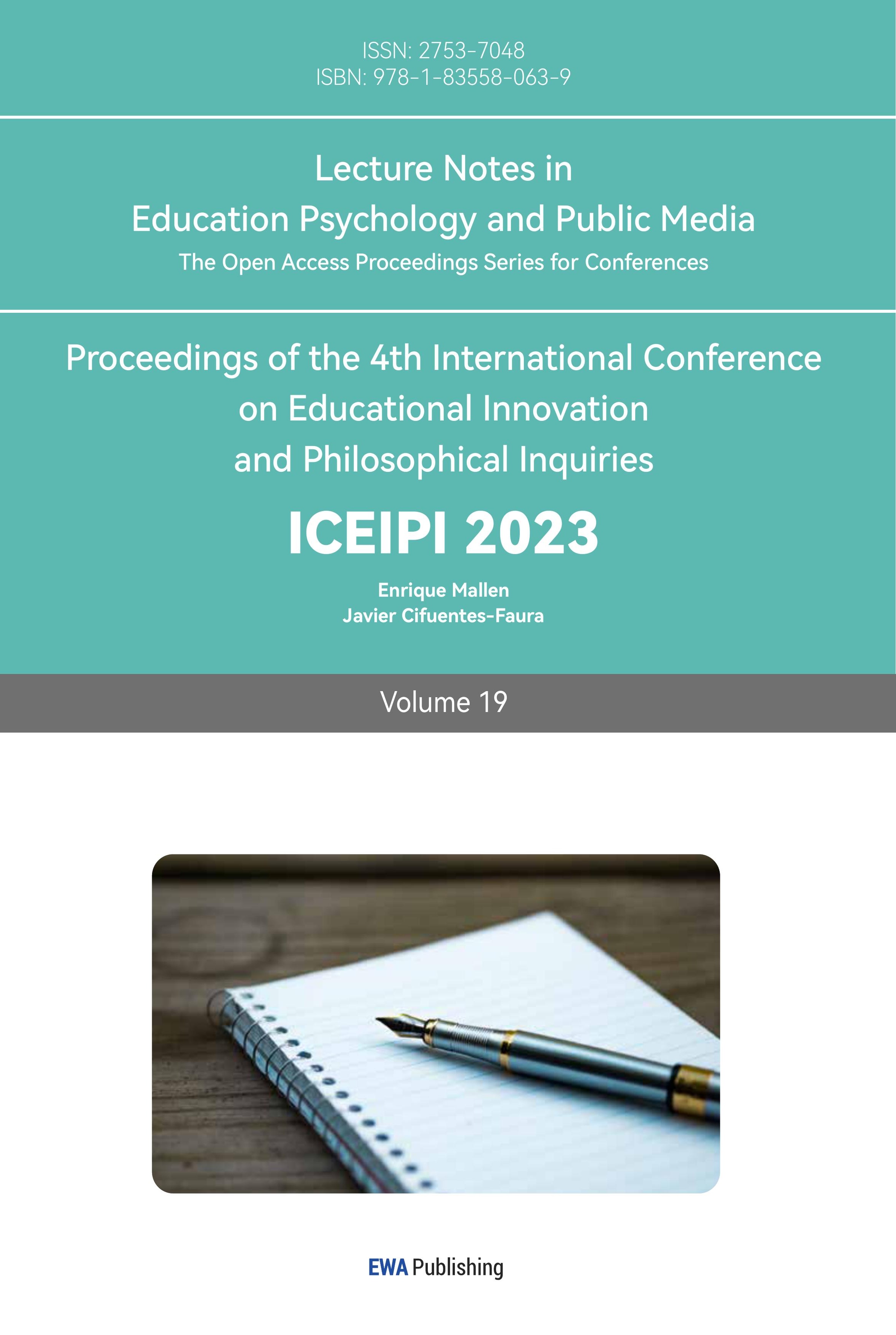References
[1]. Li, Jian. What makes shadow educational institutions possible? [D]. Southeast University,2019.
[2]. Gao Fang. The impact of family capital on shadow education participation in the perspective of educational equity[J]. Education Watch,2020,9(48):59-62.
[3]. Bian Yanjie, Wu Xiaogang, Li Lulu. Social stratification and mobility: New developments in foreign scholars' research on China - Introduction: Review and outlook [M] Beijing: Renmin University of China Press, 2008.1-30.
[4]. Li Chunling. Socio-political changes and inequality of educational opportunities - the impact of family background and institutional factors on educational access (1940-2001). [J]. China Social Science, 2003, (3):86-99.
[5]. Liu ZM, Gao Y. Family capital, social stratification and higher education access--An empirical study based on Jiangsu Province[J]. Higher Education Research,2011, (12):18-27.
[6]. Jiang Guohe, Yan Guangfen. Urban and rural family capital and children's academic achievement[J]. Educational Science, 2006, (8).
[7]. Xue, Haiping. Extracurricular tuition, academic achievement and social reproduction [J]. Education and Economics, 2016, (2):32-43.
[8]. Xue, H. P., Ding, S. H. A study of educational remediation among urban students in China[J]. Educational Research, 2009, (1):39-46.
[9]. Chu, Hongli. Background characteristics and personal factors of extracurricular tutoring families of primary and secondary school students in China[J]. Journal of Educational Scholarship, 2009(12):22-27.
[10]. Hong Yanbi, Zhao Yandong. From capital to habituation: the stratification of family education patterns in urban China[J]. Sociological Research, 2014, (4):73-93.
Cite this article
Zhou,X. (2023). Exploring the Relationship Between Family-related Factors and the Effectiveness of Shadow Education. Lecture Notes in Education Psychology and Public Media,19,161-164.
Data availability
The datasets used and/or analyzed during the current study will be available from the authors upon reasonable request.
Disclaimer/Publisher's Note
The statements, opinions and data contained in all publications are solely those of the individual author(s) and contributor(s) and not of EWA Publishing and/or the editor(s). EWA Publishing and/or the editor(s) disclaim responsibility for any injury to people or property resulting from any ideas, methods, instructions or products referred to in the content.
About volume
Volume title: Proceedings of the 4th International Conference on Educational Innovation and Philosophical Inquiries
© 2024 by the author(s). Licensee EWA Publishing, Oxford, UK. This article is an open access article distributed under the terms and
conditions of the Creative Commons Attribution (CC BY) license. Authors who
publish this series agree to the following terms:
1. Authors retain copyright and grant the series right of first publication with the work simultaneously licensed under a Creative Commons
Attribution License that allows others to share the work with an acknowledgment of the work's authorship and initial publication in this
series.
2. Authors are able to enter into separate, additional contractual arrangements for the non-exclusive distribution of the series's published
version of the work (e.g., post it to an institutional repository or publish it in a book), with an acknowledgment of its initial
publication in this series.
3. Authors are permitted and encouraged to post their work online (e.g., in institutional repositories or on their website) prior to and
during the submission process, as it can lead to productive exchanges, as well as earlier and greater citation of published work (See
Open access policy for details).
References
[1]. Li, Jian. What makes shadow educational institutions possible? [D]. Southeast University,2019.
[2]. Gao Fang. The impact of family capital on shadow education participation in the perspective of educational equity[J]. Education Watch,2020,9(48):59-62.
[3]. Bian Yanjie, Wu Xiaogang, Li Lulu. Social stratification and mobility: New developments in foreign scholars' research on China - Introduction: Review and outlook [M] Beijing: Renmin University of China Press, 2008.1-30.
[4]. Li Chunling. Socio-political changes and inequality of educational opportunities - the impact of family background and institutional factors on educational access (1940-2001). [J]. China Social Science, 2003, (3):86-99.
[5]. Liu ZM, Gao Y. Family capital, social stratification and higher education access--An empirical study based on Jiangsu Province[J]. Higher Education Research,2011, (12):18-27.
[6]. Jiang Guohe, Yan Guangfen. Urban and rural family capital and children's academic achievement[J]. Educational Science, 2006, (8).
[7]. Xue, Haiping. Extracurricular tuition, academic achievement and social reproduction [J]. Education and Economics, 2016, (2):32-43.
[8]. Xue, H. P., Ding, S. H. A study of educational remediation among urban students in China[J]. Educational Research, 2009, (1):39-46.
[9]. Chu, Hongli. Background characteristics and personal factors of extracurricular tutoring families of primary and secondary school students in China[J]. Journal of Educational Scholarship, 2009(12):22-27.
[10]. Hong Yanbi, Zhao Yandong. From capital to habituation: the stratification of family education patterns in urban China[J]. Sociological Research, 2014, (4):73-93.









